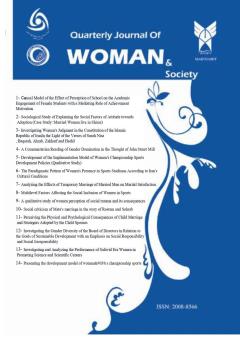The role of value orientation of female managers in the relationship between epistemological beliefs and jihadist management
Subject Areas :
1 - Assistant Professor of Business Administration, Islamic Azad University, Shiraz Branch
Keywords: Jihadi management, epistemological beliefs, value orientation.,
Abstract :
Introduction: The aim of the current research was the role of value orientation of female managers in the relationship between epistemological beliefs and jihadist management. Methods: The studied population included 590 women school principals in the four educational districts of Shiraz. Based on Morgan's table, 235 people were selected as samples. Stratified random sampling method was used in this research. In order to collect data, three standard questionnaires were used: Schwartz's value orientation Jihadi management by Ashtiani and Poursadegh and Schumer's epistemological beliefs. Applied, descriptive and correlational research methods were used in the research method. The validity of the questionnaire was confirmed by professors and experts, and the reliability was obtained by calculating Cronbach's alpha, which was 0.92, 0.81 and 0.84 for all three questionnaires, respectively. Data were analyzed using Pearson's correlation test, t-test of independent groups and structural equations. Findings: The results showed that there was a direct and significant relationship between epistemological beliefs, value orientation and jihadi management. There is also a positive and significant relationship between the components of epistemological beliefs and intellectual capital. There is a positive and significant relationship between the components of epistemological beliefs and value orientation. There is a positive and significant relationship between value orientation and dimensions of jihadi management. The results of the path analysis test showed that value orientation played a mediating role in the relationship between epistemological beliefs and jihadist management. Conclusion: The desire of female managers towards value orientations makes them use their maximum power in achieving jihadi management components. Appropriate policies and planning can increase managers' familiarity with epistemological beliefs, value orientation, and familiarity with the jihadist management components of female managers.
1. Abdi, A., Moradi, A. the relationship between epistemological beliefs and the orientation of primary school teachers, the first national conference of behavioral and Islamic sciences. Library and Information Sciences, 2021; 21(1): 153-179. In Persian.
2. Abdoli, S., Ahmadi, J., Isazadegan, A. the relationship between collective efficacy beliefs and self-efficacy beliefs with job satisfaction of male secondary school teachers in Qom, Career and Organizational Counseling, 2022; 4, (10): 12-37. In Persian.
3. Abedini, Y., Mahdian, M. Epistemological Beliefs, First National Conference of Educational Sciences and Psychology. 2013; 23, (3):111-137. In Persian.
4. Beheshtayin, M. Islamic jihadi management and productivity, opportunities and challenges, new research approaches in management and accounting. 2023; 5, (16): 13-29. In Persian.
5. Behjat, A., Fardanesh, H., Friday, I. the relationship between epistemological beliefs and teachers' teaching orientations, Iran Curriculum Studies, 2015; 9, (36): 67- 81. In Persian.
6. Esfahani, S., Formehini, M. Analysis of Values Representation Methods in Persian Blogs, Jahani Media. 2022; 6, (11): 45-57. In Persian.
7. Farhi, A., Sanjaghi, M., Soltani, M. Designing a pattern of Jihadi culture, one of the institutions of the Islamic Revolution. Human Resource Management Research Quarterly. 2015; 8, (2): 53-83. In Persian.
8. Kessels, U. How epistemological beliefs relate to values and gender orientation. Learning and Individual Differences. 2023; 23, (3): 256-261.
9. Madani, J. Conceptual link of organizational transparency and healthy organizational culture in institutions. Govt (case study: Judiciary supervisory organizations), Organizational Culture Management Magazine. 2020; 20, (45): 67-89. In Persian.
10. Maroufi, Y., Turban, S. analysis of the status of teachers' epistemological beliefs (a case study of secondary school teachers of the 1st district of Hamedan city), the first nationwide scientific research congress on the development and promotion of educational sciences and psychology, sociology and social cultural sciences of Iran. 2024; 12, (7): 34-56. In Persian.

